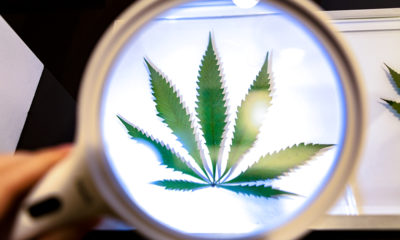Medical
Compassion Club Owner Challenges Canadian Medical Marijuana Law
Photo by Damian Dovarganes
Two Canadian men being tried on charges of possessing a controlled substance for the purpose of trafficking have filed a constitutional challenge against Canada’s medical marijuana law, arguing that it prevents patients from accessing safe and tested medicine.
In November 2011, Carl Anderson, owner/operator of Canadian Safe Cannabis Society, a cannabis compassion club in Kamloops, British Columbia, and his business partner, Wesley Jenkins, were charged with possession of about 3 kilograms (6.6 pounds) of marijuana that police allegedly found in the deli-style case at his storefront operation. Their trial began on Feb. 17 and the constitutional challenge is scheduled to be heard in provincial court on March 3.
Marijuana compassion clubs have never been officially licensed or sanctioned in Canada, but they have often been tolerated due to law enforcement discretion. Advocates contend that compassion clubs, which require a doctor’s recommendation, provide patients with access to a variety of forms of cannabis, including concentrates, edibles, tinctures and salves. Compassion clubs are also a resource for patients in need of support and guidance. Canada’s new rules, the Marihuana for Medical Purposes Regulations (MMPR), which go into effect April 1, allow patients with a doctor’s prescription access only to dried cannabis from a government-licensed provider, sent through the mail.
Anderson’s experiences with cannabis began after a head injury in 1997. Conventional pharmaceuticals were ineffective and led to depression, constant pain and suicidal thoughts. Anderson began experimenting with marijuana and marijuana derivatives and stopped taking pharmaceuticals, and his suicidal thoughts went away.
But according to court documents, Anderson discovered that the street marijuana he purchased was moldy or didn’t contain the chemical ingredients necessary to control his pain. He also claims he was robbed by a drug dealer. Anderson, who takes cannabis oil pills for pain, formed the Canadian Safe Cannabis Society, which tested and analyzed marijuana.
Marijuana testing and sales are forbidden under Canada’s Controlled Drugs and Substances Act.
“Every other plant is governed by Food and Drug Act regulations,” said Attorney Shawn Buckley, who is representing Anderson and Jenkins.
The litigants argue that the Act violates section 7 of the Canadian Charter of Rights and Freedoms, which guarantees Canadians the right to life, liberty and security of the person. The application contends that the Act places patients who require medical marijuana at risk since there is no practical way to test the safety or chemical components of medical marijuana without the assistance and expertise of compassion clubs.
But the testing at Canadian Safe Cannabis Society turned out to be the catalyst for the raid by the Royal Canadian Mounted Police and led to the charges against Anderson and Jenkins.
“If the law causes illegal behavior, if that person must break the law to protect their health, then the law violates the principles of fundamental justice,” the challenge argues.
Anderson’s constitutional challenge is similar to one made by Toronto resident Terry Parker, who had been charged with possession and cultivation several times between 1987 and 1996. In Regina v. Parker, the Ontario Court of Justice ruled in 1997 that Canada’s Charter of Rights and Freedoms extended to the “security of the person” and found Parker not guilty by reason of medical necessity.
That court ruling set the stage for Canada’s Marihuana Medical Access Program (MMAP), which is being replaced this year by the MMPR.
Watch Anderson and Buckley discussing the constitutional challenge.

























